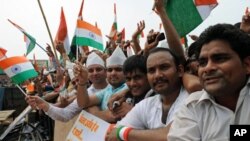As anti-corruption protests grow in India, the prime minister says he is open to a debate on the issue of an anti-graft bill, which has become the point of contention between his government and civil society activists. But there is no sign that the standoff between the two sides is easing.
As anti-corruption campaigner Anna Hazare’s hunger strike entered the seventh day, tens of thousands turned up to express solidarity with him at an open park in New Delhi, which is the venue of his protest.
Doctors say he has lost five kilograms, but is in good health.
The weekend saw unprecedented crowds across the country rally in support of Hazare’s campaign . People carrying caps emblazoned with the words “I am Anna Hazare” and waving flags have marched in Mumbai, Bangalore, Chennai and many other towns and cities.
Hazare wants the government to withdraw an anti-corruption bill it has introduced in parliament and pass a version civil society activists have drafted by August 30.
Under mounting pressure from the protests, Prime Minister Manmohan Singh says the government anti-corruption bill, called the Lokpal, is a “working draft” that can be changed. He says those who have differences with the bill should go through parliamentary procedures.
“We have made it clear that all concerned individuals should convey their concerns on different aspects of the bill to their representatives in parliament and to a Standing Committee. The Standing Committee has the power to propose any amendment or amendments. We are open to a reasoned debate on all these issues,” Singh stated.
Singh also said that while an anti-corruption watchdog will help, it will not solve the problem. He says corruption cannot be removed in one stroke, and the complexity of rooting it out is not being appreciated.
But civil society activists, boosted by the huge support they have received in the past week, are in no mood to back off from their demand of a powerful ombudsman. They are insisting that the prime minister, the judiciary and lower level officials, which the government wants to exclude from the scope of the legislation, should be included.
One of the civil society activists on the frontlines of the campaign, Arvind Kejriwal, explained to a huge audience why the government bill will not remove petty corruption, which affects ordinary citizens.
He says when people go to a government office, they have to pay a bribe or run from pillar to post (spend unnecessary time). He says they are demanding that jobs such as issuing rations cards, getting pensions, birth certificates and more should be done within a time limit or attract a penalty for concerned officials.
The government has not agreed to bring all officials under the proposed watchdog saying this would need a vast new machinery. The government also points out that the prime minister and sitting judges are immune from prosecution in Western democracies to protect them from becoming mired in lawsuits by political opponents.
Both sides have said they are open to talks, but there has been no move yet to start formal negotiations.
India Anti-Corruption Protests Grow




